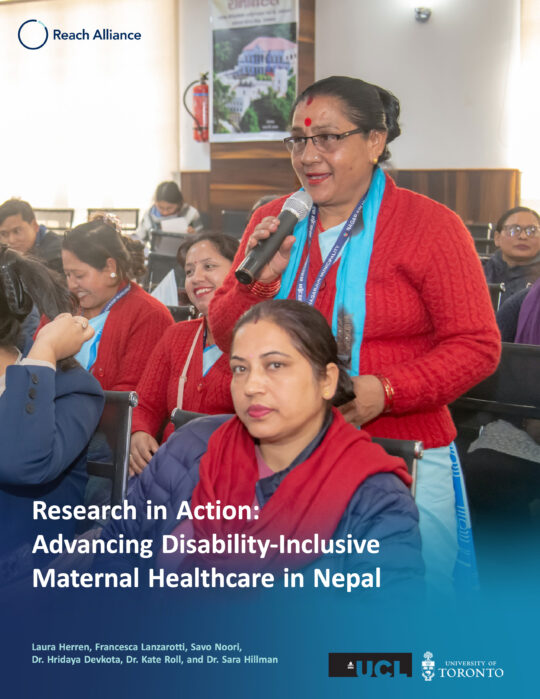How does it work?
Recruitment
Students from all fields of study, at both the undergraduate and graduate levels, are recruited to the Reach Alliance.
Mentorship
Once chosen, students are mentored for 12-18 months by dedicated faculty mentors as they undertake their research.
Research Ethics
Reach researchers complete their own REB protocols (research ethics) and get required approval from ethics boards.
Primary Research
Student teams complete primary research, conducting interviews with key stakeholders involved in local project implementation.
Generate Actionable Insights
Once they complete primary research, teams produce a case study report, highlighting the findings from each project.
Knowledge Translation
The findings are published in journals, shared with practitioners and policymakers and presented at the annual Reach Symposium.
Professional Skills Development
Student research is complemented by a comprehensive skills development series delivered by field experts. These include workshops on quantitative research, qualitative research, research methods, research ethics and field-interview practices.
Performance Coaching
Throughout the year, each team also receives professional performance coaching from a qualified Coach & Culture Strategist.
Alumni Network
Not only does the Reach Alliance produce world-class research, it also cultivates a new group of global problem-solvers and purpose-driven leaders.
Collaboration
Working hand-in-hand with the private sector, governments, NGOs, and academics, the Reach Alliance brings new insights, tools, and a new generation of leaders to the fore.
What happens once selected?
Reach has developed a unique approach to uncover how and why certain interventions are able to reach the world’s poorest of the poor. Over 12-18 months, research teams conduct extensive secondary and primary research, and receive in-depth training and coaching to foster purpose-driven moral leadership that will accelerate their capacity to tackle the world’s most pressing challenges.
1. Orientation Sessions
Selected candidates for the next cohort will participate in required in-person orientation sessions in April (TBD).
2. Selection of Case Studies
Following orientation, researchers will undergo a process of vetting highly innovative interventions that have demonstrated success in reaching hard to reach populations and connection to UN SDG Goals. Researchers will prepare presentations on case studies where faculty mentors and fellow researchers will provide input to develop research question.
Past case studies have examined such topics as: how to reach refugees with a biometric cash assistance program in Jordan; how to eliminate mother-to-child transmission of HIV in Thailand; how to get affordable solar panels to nomadic herders in Mongolia; and how to provide self-directed home care to the elderly and people living with chronic disabilities.
Researchers are expected to be available for weekly evening pitching from July to September.
3. Research Team Formation & Training Camp
Once case studies are selected for investigation, research teams are formed, and faculty mentors and performance coaching are designated. Students are mentored for 12-18 months by dedicated faculty mentors and team performance coaches are designated to work with the team throughout the year.
At the onset of the teams forming, researchers will undergo two training camp sessions with their designated professional team performance coach. Training camp helps researchers identify each other’s strengths, create a team charter, learn team best practices, and share reciprocal expectations. The coaches provide teams with and on-on coaching and group sessions to share regular feedback to develop a team culture that drives high performance throughout the year.
4. Professional Skills Development Series
In conjunction with the research process, students participate in a series of workshops that build professional skills to support their research activities throughout the academic year. The Reach Alliance has developed a bespoke career offboarding program aimed at preparing Reach researchers for the next professional step. Our career development workshops and one-on-one coaching, to help Reach researchers craft their career stories; clarify their skills and how these skills can be applied to drive real-world impact; claim their personal values and help to define meaningful work.
5. Team Performance Coaching
Teamwork underpins success at the Reach Alliance. Student researchers join Reach from across all academic disciplines, and from undergraduate and graduate degree programs, and collaborate to plan, execute and present an innovative and rigorous research project that investigates how to reach hard-to-reach populations with essential goods and services. Our professional performance coaching program ensures that each researcher can contribute unique knowledge, skills and experience in the context of interdisciplinary teams to drive high performance. Performance coaching differentiates the Reach program from other extracurricular initiatives at the U of T and our partner universities.
*Learn more about our coaching program here: https://reachalliance.org/performance-coaching-enhances-teamwork-for-better-research/
“Our performance coach helped guide our team as we progressed with our project, and the lessons we learned from him stayed with us…Even now, when I am leading initiatives or mentoring a group of students, I use the techniques I learned as a Reach researcher to build and develop effective teams.” – Peter Zhang, Reach Alliance U of T, 2018-19
6. Primary Research and Case Report Knowledge Translation
When the data collection is completed in the field, teams produce a case study report, highlighting the actionable insights from each project. Research findings are presented at the annual Reach Conference attended by leading thinkers, researchers and practitioners from the public, private and civil society sectors. Some teams have gone on and published their research in prominent journals and media outlets: https://reachalliance.org/publications/
